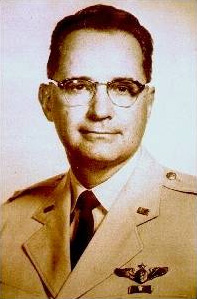Murphy’s Law is a famous maxim that is known and recited throughout the world.

It states that ‘Anything that can go wrong, will go wrong.’ While there are numerous slight variations to the wording, the fatalistic message is clear: No matter how smart a decision you think you have made or how well you plan and prepare something, the universe will find a way to make it go wrong.
Origin of Murphy’s Law
The law is named after an American aerospace engineer called Captain Edward Murphy Jr. In 1949, Murphy attended a test at Edwards Air Force Base in California.
The project team were trying to determine how much gravitational force a human was able to withstand.
A member of the team, Colonel Dr John Paul Stapp, rode a rocket sled at a speed of more than 200mph. The sled would stop in less than a second to simulate the force of an airplane.

Colonel Stapp did this for months and suffered several injuries including broken bones.
Murphy’s sensors
When Murphy attended, he brought a set of sensors that were capable of measuring the G force that was applied when the rocket stopped.
A technician attached the sensors to Colonel Stapp’s harness. When the team came to check the results the sensors hadn’t worked – they all read zero.
It turned out that there had been two different ways that each sensor could have been attached but only one of the ways was correct and would give readings.
The unfortunate technician had attached every sensor the wrong way.
Technician found the wrong way

Murphy is believed to have said something along the lines of: “If there are two ways of doing something, one of which will end in disaster, that guy will always do it that way.”
It was a negative quote attacking the competence of the technician. However, after Murphy left, Colonel Stapp turned the phrase on its head.
He used the law as a positive to help remind the team of how many things can go wrong, and to take necessary steps to prevent them.
He later told a press conference that the team had followed ‘Murphy’s Law’, which meant that ‘Anything that can go wrong, will go wrong’.
With this in mind they always explored every possible danger and this explained the team’s excellent safety record.
Variations of Murphy’s Law
Murphy’s Law has been expanded and tweaked on several occasions to suit a particular circumstance. Here are some of the most common.
• Everything takes longer than you expected.
• Nothing is as easy as it looks.
• If there is a worst possible time for something to go wrong, that is when it will go wrong.
• If only ten possible things can wrong and you prepare for them all, an eleventh will appear and go wrong.
• If something could have gone wrong but didn’t, it would have been more beneficial in the long run if it had gone wrong.
There is even a law that states that if you criticise a person’s writing while editing or proofreading, there will be a similar mistake in your own criticism.
The law is called Muphry’s Law – a deliberate misspelling of Murphy’s Law. More on Muphry’s Law
One of the key players in the coining of the term Murphy’s Law, Colonel Stapp, also coined his own law.
It was called Stapp’s Ironical Paradox, and said: “The universal aptitude for ineptitude makes any human accomplishment an incredible miracle.”
Sod’s Law
While the phrase ‘Murphy’s Law’ was coined in 1949, it wasn’t a new idea. A similar idea known as Sod’s Law has existed for centuries. It states that no matter how well you prepare, the opposite will happen.
For example, Sod’s Law means that if a person forgets to bring umbrella out with them then it will surely rain. However, if they plan ahead and bring the umbrella then it will inevitably stay dry.
It also suggests that when you join a short queue at a supermarket, a longer queue will move faster and somebody who joined it at the same time that you joined the short queue will still be served faster.
It is known as ‘Sod’s Law’ because misfortune can happen to ‘any poor sod’.
Other Laws
O’Malley’s Law follows on from Murphy’s Law and states ‘If it can’t possibly go wrong, it will.’
Parkinson’s Law states that ‘work will expand to fill the time allowed for its completion.’
Mencken’s Law states ‘those who can, do. Those who cannot, teach.’
Boob’s Law states that ‘you will always find something in the last place you look.’
Acton’s Law states ‘power corrupts, absolute power corrupts absolutely.’
